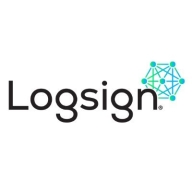

Splunk Enterprise Security and Logsign Next-Gen SIEM are competitors in the security information and event management sector. Splunk often takes the lead due to its extensive analytics capabilities and comprehensive integration, although Logsign stands out for its cost-effectiveness and simplicity.
Features: Splunk Enterprise Security provides advanced threat detection, user behavior analytics, and robust integration with various data sources. Its machine learning capabilities support proactive threat hunting. Logsign Next-Gen SIEM offers a user-friendly dashboard, rapid deployment, and automated threat detection, making it a valuable choice for teams looking for simplicity and quick implementation.
Room for Improvement: Splunk's high complexity necessitates reducing the need for specialized skills and simplifying deployment. Enhancements in real-time predictive capabilities and out-of-the-box integrations could improve accessibility. Logsign should focus on enhancing analytics depth and threat correlation capabilities. Additionally, improving third-party integration and expanding its feature set could increase its competitiveness.
Ease of Deployment and Customer Service: Logsign excels with fast deployment and straightforward setup processes, appealing to organizations with limited resources. Its customer service is prompt, enhancing the user experience. In contrast, Splunk's deployment requires specialized skills, though its robust support network aids in long-term management and troubleshooting.
Pricing and ROI: Splunk involves a higher initial setup cost, which is justified by its comprehensive functionalities and scalable solutions potentially leading to high ROI in complex applications. Logsign is more cost-effective initially and appeals to businesses focused on short-term investments without sacrificing essential security features.
| Product | Market Share (%) |
|---|---|
| Splunk Enterprise Security | 9.2% |
| Logsign Next-Gen SIEM | 0.5% |
| Other | 90.3% |


| Company Size | Count |
|---|---|
| Small Business | 110 |
| Midsize Enterprise | 50 |
| Large Enterprise | 257 |
Logsign delivers automation-driven cyber security solutions and are committed to providing the smartest, easiest-to-use and most affordable cybersecurity detection and response solutions and value-added services. Logsign Next-Gen SIEM is an enterprise-grade SIEM, inline with our promise, it's easy-to-deploy, easy-to-use and affordable unlike the other enterprise-grade SIEM softwares.
Splunk Enterprise Security delivers powerful log management, rapid searches, and intuitive dashboards, enhancing real-time analytics and security measures. Its advanced machine learning and wide system compatibility streamline threat detection and incident response across diverse IT environments.
Splunk Enterprise Security stands out in security operations with robust features like comprehensive threat intelligence and seamless data integration. Its real-time analytics and customizable queries enable proactive threat analysis and efficient incident response. Integration with multiple third-party feeds allows detailed threat correlation and streamlined data visualization. Users find the intuitive UI and broad compatibility support efficient threat detection while reducing false positives. Despite its strengths, areas such as visualization capabilities and integration processes with cloud environments need enhancement. Users face a high learning curve, and improvements in automation, AI, documentation, and training are desired to maximize its potential.
What Are the Key Features of Splunk Enterprise Security?In specific industries like finance and healthcare, Splunk Enterprise Security is instrumental for log aggregation, SIEM functionalities, and compliance monitoring. Companies leverage its capabilities for proactive threat analysis and response, ensuring comprehensive security monitoring and integration with various tools for heightened operational intelligence.
We monitor all Security Information and Event Management (SIEM) reviews to prevent fraudulent reviews and keep review quality high. We do not post reviews by company employees or direct competitors. We validate each review for authenticity via cross-reference with LinkedIn, and personal follow-up with the reviewer when necessary.